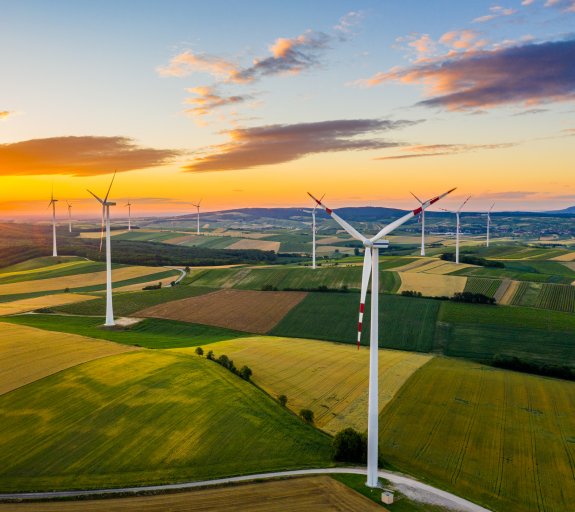
The impact of the Ukraine crisis on climate change
- 07 June 2022 (10 min read)
What the impact of war means for the race to net zero
- Russia’s invasion of Ukraine has significantly disrupted energy markets and accelerated the EU’s ambition to reduce its dependence on Russian fossil fuels.
- The European Commission plans to accelerate its already ambitious renewable technology implementation plans, which should raise the average emissions reduction pace to -5.0% per annum, from -4.8%.
- However, we are sceptical of Europe’s ability to pivot away from Russian gas as quickly as planned, and of its goals to grow renewable technology, particularly wind, at the envisaged pace. Even as planned, we estimate Europe will remain vulnerable to any interruption of gas supplies until 2024 – in practice this could be longer.
- The expected gas shortfall is likely to be met by existing fossil fuel capacity, including an increase in coal-fired generation. This will likely raise emissions to a range that is likely to be higher over the coming decade than either ‘Fit for 55’ or the EU’s new plans suggest.
- The 1970s marked a key turning point in oil intensity usage. The current crisis could mark a similar turning point for energy markets ushering in a range of new technologies to lower emissions output.
War in Ukraine will impact the battle against climate change
There are no doubt multiple factors that led to Russia’s decision to invade Ukraine. One was likely to have been a calculation that European dependence on Russian fossil fuels – particularly gas – would limit the severity of any resulting sanctions on Russia from the West. Such a judgement would have considered low European gas inventories, elevated inflation pressures and the fact that Europe’s Fit for 55 climate action plan envisaged a gradual reduction of gas imports over the coming decade in a bid to reduce greenhouse gas (GHG) emissions by 55% of 1990 levels by 2030. Such an analysis would have suggested some leverage of Russian gas supply now, but that would be likely to fade over time.
Such a calculation now appears misplaced. The sanctions against Russia have been deeper, more far-reaching, and more unified than many had expected. Moreover, the consequence of the inevitable increase in energy prices – particularly for European natural gas – has been for the European Commission to propose an even quicker shift in gas imports to reduce Europe’s dependency on Russian supply. Europe has already banned Russian coal, but it is now considering sanctions on Russian imports of oil and even gas.
In this paper, we look at Europe’s plans to reduce its dependency on Russian gas. We calculate the likely impact on the EU’s GHG emissions if Russian gas supplies to Europe were halted – requiring substitution, and higher-emitting fuels, to be used for generation capacity to temporarily fill the breach. However, in the medium term the swifter shift to non-fossil fuel generation would likely see emissions fall faster. We then critically assess the plausibility of these assumptions. Exhibit 1 illustrates our estimates of the impact on GHG emissions of the EU’s new plans, and an estimated range of a likely path of emissions.

Our experts and investment teams outline their key convictions
Visit the instituteDisclaimer
This document is for informational purposes only and does not constitute investment research or financial analysis relating to transactions in financial instruments as per MIF Directive (2014/65/EU), nor does it constitute on the part of AXA Investment Managers or its affiliated companies an offer to buy or sell any investments, products or services, and should not be considered as solicitation or investment, legal or tax advice, a recommendation for an investment strategy or a personalized recommendation to buy or sell securities.
It has been established on the basis of data, projections, forecasts, anticipations and hypothesis which are subjective. Its analysis and conclusions are the expression of an opinion, based on available data at a specific date.
All information in this document is established on data made public by official providers of economic and market statistics. AXA Investment Managers disclaims any and all liability relating to a decision based on or for reliance on this document. All exhibits included in this document, unless stated otherwise, are as of the publication date of this document.
Furthermore, due to the subjective nature of these opinions and analysis, these data, projections, forecasts, anticipations, hypothesis, etc. are not necessary used or followed by AXA IM’s portfolio management teams or its affiliates, who may act based on their own opinions. Any reproduction of this information, in whole or in part is, unless otherwise authorised by AXA IM, prohibited.
Risk Warning
The value of investments, and the income from them, can fall as well as rise and investors may not get back the amount originally invested.